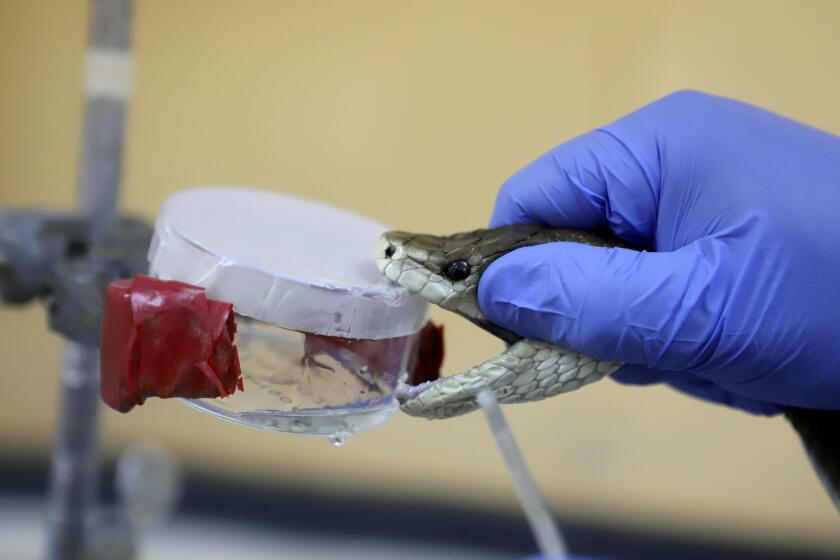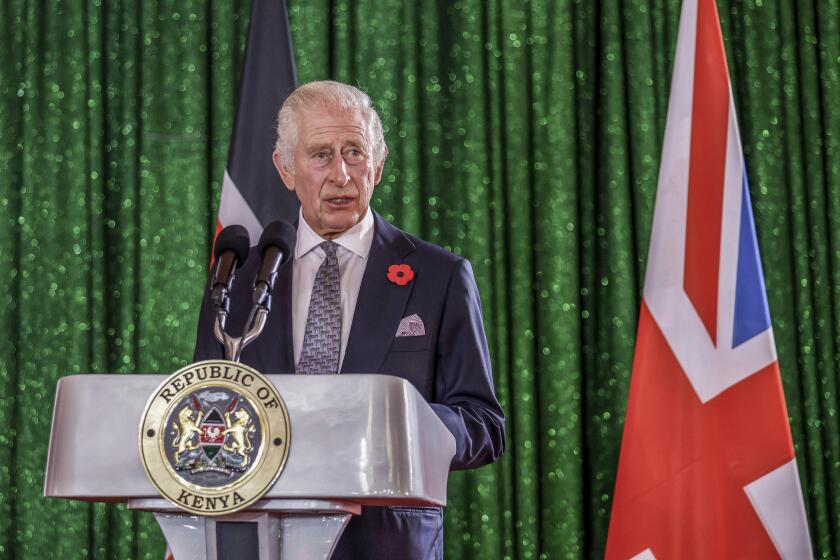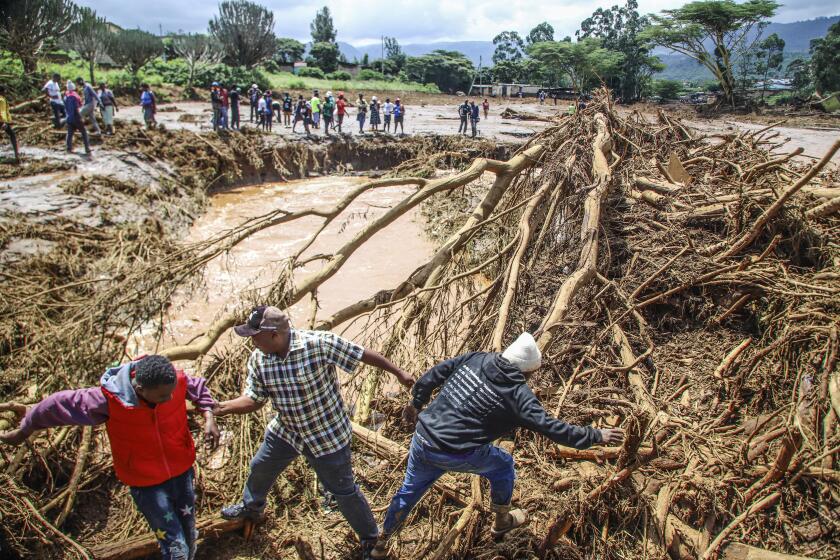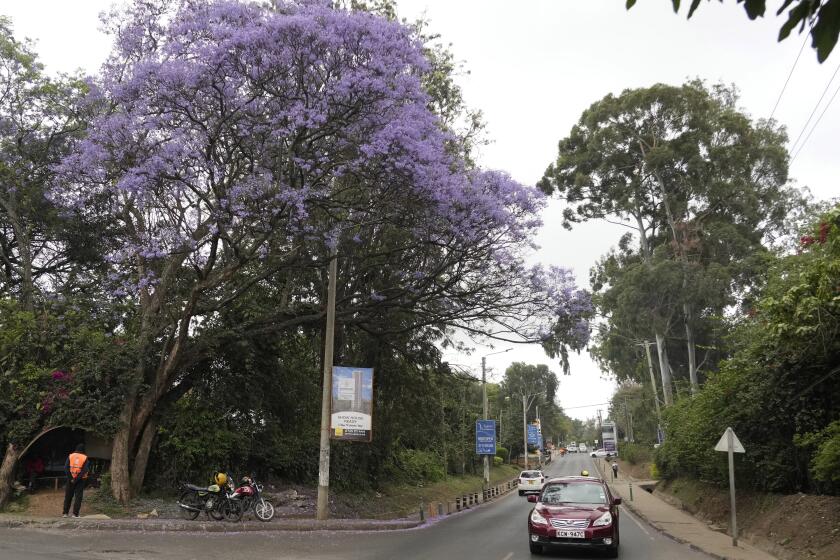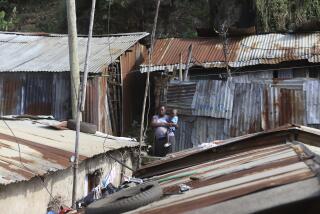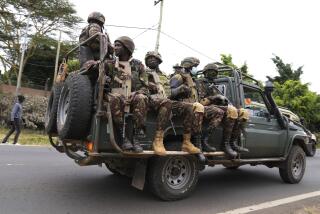Kenya’s president vows calm ‘at whatever cost’ after parliament stormed, set ablaze

- Share via
NAIROBI — Kenya’s president called the storming of parliament on Tuesday a national security threat and vowed that such unrest won’t happen again “at whatever cost,” after thousands of protesters against a new finance bill pushed their way in, burning part of the building and sending legislators fleeing. It was the most direct assault on the government in decades.
Journalists saw at least three bodies outside the complex where police had opened fire, and medical workers reported five others killed. Clashes spread to other cities. There was no immediate word on arrests.
“Today’s events mark a critical turning point on how we respond to threats to our national security,” President William Ruto said, calling the events “treasonous.” Kenya’s defense minister said the military had been deployed to support police during the “security emergency” and “breaching of critical infrastructure.”
Protesters had demanded that legislators vote against the bill imposing new taxes on East Africa’s economic hub, where frustrations over the high cost of living have simmered. Youths who had voted Ruto into power with cheers for his promises of economic relief have taken to the streets to object to the pain of reforms.
Antivenom for snakebites can be hard to find in Kenya, where about 4,000 snakebite victims die every year.
But lawmakers voted to pass the bill, then fled through a tunnel as protesters outmaneuvered police and poured in. The fire was later put out.
At least five people were shot dead while treating the wounded, the Kenya Medical Assn. and other groups said in a statement. It said more than 30 people were wounded, at least 13 with live bullets. Police fired live ammunition and threw tear gas canisters at protesters, who sought treatment at a medical tent at a nearby church. Elsewhere in town, Kenyatta National Hospital said it received 45 victims.
One person shot dead was wrapped in a Kenyan flag and carried away. Another lay on the sidewalk, their head in the gutter.
Internet service in the country noticeably slowed in what NetBlocks called a “major disruption,” and at least one broadcaster issued a statement saying that “we have received threats from the authorities to shut us down.”
Ruto had been outside Nairobi attending an African Union retreat. He was expected to sign the finance bill into law this week. He has two weeks to act but faces calls from religious and other leaders to think again.
The nearby office of the Nairobi governor, a member of the ruling party, was also briefly on fire Tuesday, smoke pouring from its white facade. Police water cannons were used to extinguish the fire.
King Charles III expressed ‘greatest sorrow and the deepest regret’ for the ‘abhorrent and unjustifiable acts of violence’ committed against Kenyans.
Protesters could be heard shouting, “We’re coming for every politician.”
The Kenya Human Rights Commission shared a video of officers shooting at protesters, and it urged Ruto to issue an immediate order to “stop the killings.”
The president instead said the government had “mobilized all resources” to ensure order.
On Sunday, Ruto tried to calm the rising public tensions, saying he was proud of the young Kenyans who came out to exercise their democratic duty in earlier protests. The politician who had promoted himself as a “hustler” from humble beginnings said he would engage them on their concerns.
Youths had announced they were uniting to keep the government in check as prices for fuel, food and other necessities have soared. In Nairobi, a regional hub for expatriates and home to a United Nations complex, the inequality among Kenyans has sharpened along with long-held frustrations over state corruption.
On Kenya’s longest river, the Tana, water levels at the Masinga and Kiambere hydroelectric dams have reached historical highs, and people downstream are being told to move.
Opposition to the finance bill has united a large part of the country, with some explicitly rejecting the tribal divisions that have torn Kenya apart in the past. Some who had passionately supported Ruto felt betrayed.
“I fell for his lies. Now I’m out here regretting why I voted for him,” youth Oscar Saina told the Associated Press last week
As throngs of protesters rushed through the streets Tuesday, defiance emerged elsewhere in the country — including in the town where the president was, Naivasha, as protesters chanted, “Ruto must go.”
Protesters tried to storm the State House in the western city of Nakuru, a witness said. There were clashes in the western lakeside city of Kisumu. The governor of Mombasa, Kenya’s second-largest city, joined protesters outside his office and expressed his support for them.
Protesters burned ruling party offices in Embu in central Kenya, the Nation newspaper reported. Citizen TV showed video from Nyeri in central Kenya with police confronting protesters in the smoking streets.
A national gathering of Catholic bishops urged police not to attack protesters and pleaded with the government to listen to citizens’ pain over the “unwarranted” taxes, saying “the country is bleeding ... families are immensely suffering.”
Two people died in similar protests last week, and civil society groups have raised the alarm about a crackdown.
Nov. 13 will be a public holiday in Kenya for citizens to plant trees, as part of an ambitious plan sparked by climate change concerns to grow 15 billion new trees by 2032.
The Kenya Law Society President Faith Odhiambo said earlier Tuesday that 50 Kenyans, including her personal assistant, had been “abducted” by people believed to be police officers. Some had been vocal in the demonstrations and were taken from homes, workplaces and public spaces ahead of Tuesday’s protests, according to civil society groups.
A statement by diplomats from 13 Western countries including the United States said they were shocked by the scenes outside parliament and expressed concern about the violence and abductions of protesters.
Police officials did not immediately return calls seeking comment. Parliament Speaker Moses Wetangula had directed the inspector general of police to provide information on the whereabouts of those missing.
Also Tuesday, hundreds of Kenya’s police officers, long accused of abuses by human rights watchdogs and others, arrived in Haiti to lead a United Nations-backed multinational force against the powerful gangs that have the country in their grip. The deployment faces a legal challenge in Kenya, but Ruto’s government has gone ahead, with the thanks of President Biden.
Musambi writes for the Associated Press.
More to Read
Sign up for Essential California
The most important California stories and recommendations in your inbox every morning.
You may occasionally receive promotional content from the Los Angeles Times.
